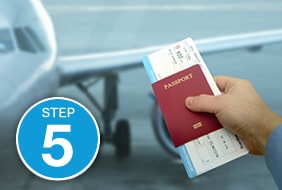5 Steps to Study Abroad Success

Student Health
Tips for Staying Healthy while Abroad
It would be in your best interest to get a physical checkup prior to going abroad checking for any ailments you might be unaware of and seeing your doctor to make sure you get any treatment needed that might not be as easy to find while abroad. Be sure to bring copies of your health records with you, just in case of emergency. Although your school may request a set of these documents, you should prepare an extra set and keep them with you. The following documents written in English (Ask your Physician) should be brought abroad:
- Personal Medical History
- Immunization Records
- Prescription for Eyeglasses or Contacts (if applicable)
- Drug Prescriptions (including a summary of any regularly used medications)
You will be adjusting to life in a completely new environment inside of a new culture while studying abroad. In making the adjustment away from the familiar lifestyle of your home country, may come some changes which affect your health. Lifestyle changes in your eating habits, sleeping patterns, local climate, and stress level, can also affect your physical health as well as your emotional well being.
Remember that it takes time to adjust to a new environment and that all of your fellow students are in the same situation. There are many people available to help you in making your adjustment as smooth as possible. Your school''s international student advisor, student health service personnel, and guidance counselors are willing to provide assistance whenever necessary.
During the process of adjusting to a new culture you may experience mixed emotions as well as periods of stress. For example, you may temporarily experience changes in moods or attitudes. Some students report anxiety and loneliness, as well as changes in sleeping and eating patterns.
Fortunately, this is only a temporary condition and there are many effective ways of reducing this stress! The first and best way to cope with unavoidable stress is to keep your body in good physical condition by eating well, exercising, and getting enough rest. Be sure to make time for activities which you really enjoy, whether alone or with the new friends you have made while abroad.
Your ESL (or university/college) school's student counselor can provide information on available programs and techniques (such as time organization, stress management, or methods of relaxation) that you can practice on your own to reduce stress and keep up your health.
Try and practice your English daily. Difficulty in communicating can be frustrating. However, this frustration is natural. As you continue to improve your English, you will become able to communicate more effectively with native-speakers. You will become able to express your ideas and preferences while making new friends, which is very satisfying!
Another way to reduce "culture shock" is to talk out your worries. If you have made some friends, talk with them about what you are thinking and feeling. If you feel more comfortable talking with a professional, seek assistance from your international student services office or the student counseling center at your school. The important thing is to express what you are feeling.
Most ESL schools, colleges, and universities have a staff of counselors, who are ready to listen and provide well informed advice. The staff members of your school's student counseling center are trained to work with students on the concerns and issues they face during both in school and in general while they are abroad.
One of the most important aspects of working with a counselor is knowing that the counselor is interested in you and your concerns. The counselor's job is to listen to you, understand the issues you are facing, and help you develop solutions to your problems. Effective counseling occurs when the counselor and client work together to find solutions and reach goals.
Many schools have staff members who are specially trained to work with international students. In some cases, these counselors were international students themselves before they completed their schooling and entered the counseling profession. In other cases, they have spent years studying the issues affecting international students and helping international students explore and resolve the issues troubling them.
In addition to one-on-one counseling about personal concerns, other services that may be available at your student counseling center include: group counseling, peer counseling, stress reduction, test taking strategies, time management, study skills, art therapy, and career advising. Inquire at your student counseling center to learn the specific services they provide.
Information you share with psychologists and other counselors is generally treated as confidential. This means that your academic adviser, foreign student adviser, friends, family, and even your doctor cannot learn about your discussions unless you tell the counselor that he or she can discuss your case. To be certain about the confidentiality rules that apply on your campus, ask at the student counseling center.
- If possible, go first to your college or university health center for treatment during their regular hours of operation.
- If the health center is closed, go to a local physician or urgent care clinic.
- Go to a hospital emergency room for serious illnesses or accidents.
Recommended for You
Apply to degree programs in the United States!
Now with ApplyESL GRADUATE, you can research and apply to a degree program in the United States. Begin your search today! It's always a good idea to prepare ahead of time.
Talk with the School!
Now you can choose your program, get in touch with the staff, and receive the information you need to get started.
Studying English at an American University Campus
Do you want to experience what it's like to be a real student in the United States? Studying English at a university is a great option. You can choose from many famous schools such as UCLA and Columbia University and enjoy living and learning on a university campus.
Choose the Best School for You
Choosing an English program is now possible without going through a study abroad agent! Here we will explain the importance of the 'Do-It-Yourself' application process!
Enjoying Life in the Country
Experience the great beauty of the countryside and the intimacy of small towns in America. Feel the kindness of the American people while studying in the traditional heartland of the United States.
Introducing Comments from ApplyESL.com Students
Learn from Experience! Successful Applications with ApplyESL.com
Trending Schools
Find the Most Popular Schools!







